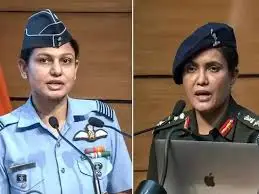‘BJP mistook Wing Commander Singh for Rajput, didn’t know Air Marshal Bharti’s caste’: SP MP Ram Gopal Yadav

Samajwadi Party (SP) MP Ram Gopal Yadav recently made headlines for his controversial comments about the caste backgrounds of Indian Air Force officers Wing Commander Vyomika Singh and Air Marshal A.K. Bharti. During a public speech, Yadav claimed that the Bharatiya Janata Party (BJP) had mistakenly believed Singh was Rajput and was unaware of Bharti’s caste. According to Yadav, this affected how the BJP approached these officers politically. His remarks quickly ignited a heated debate across political and social platforms.
The Comments and Their Context
Ram Gopal Yadav’s statement came amid discussions related to Operation Sindoor, a military briefing that became politically sensitive. Yadav alleged that the BJP targeted Colonel Sofiya Qureshi, supposedly because she was Muslim, but spared Singh because they thought she belonged to the Rajput caste. He added that the BJP didn’t even know Air Marshal Bharti’s caste, implying a lack of consistency in how they dealt with military officers.
Yadav further identified Wing Commander Vyomika Singh as a Jatav from Haryana and Air Marshal A.K. Bharti as a Yadav from Purnia. He argued that caste identity played a significant role in political targeting, suggesting the BJP’s actions were influenced by social divisions.
Political Fallout and Criticism
The BJP was quick to condemn Yadav’s remarks. They accused him of politicizing the armed forces by viewing them through a caste-based lens. Uttar Pradesh Chief Minister Yogi Adityanath called Yadav’s comments a “grave insult” to the military. He emphasized that soldiers serve India without regard to caste or religion. Yogi said such remarks only serve to divide the country and undermine the unity of the armed forces.
Other BJP leaders echoed this sentiment, stressing that the Indian military stands for merit, discipline, and national unity. They accused Yadav of attempting to sow division by bringing caste into discussions about the armed forces. The BJP’s strong reaction highlighted the sensitivity around caste in India’s political and military spheres.
Ram Gopal Yadav’s Clarification
In the face of widespread criticism, Ram Gopal Yadav clarified that his remarks were misunderstood. He said he did not intend to insult the officers or the armed forces. Instead, Yadav claimed his purpose was to highlight the BJP’s selective approach to criticizing military personnel based on their social identities.
Yadav accused the BJP of politicizing the military issue and said he was merely pointing out how caste influences political narratives. Despite this explanation, the controversy continued to draw attention, underscoring the persistent challenges of caste politics in India.
Broader Implications of the Controversy
This episode has brought caste dynamics in Indian institutions back into focus. The Indian military, ideally, is a meritocratic institution where service to the nation transcends social divisions. Yet, caste identities remain deeply rooted in India’s social and political fabric.
The controversy raises important questions about how caste influences perceptions even in sectors like defense, where loyalty to the country should be paramount. It also exposes how politicians sometimes use caste to frame narratives that benefit their agendas.
The Importance of Merit and Unity in the Armed Forces
Many voices from civil society, the military, and politics have stressed the importance of focusing on merit and national unity. The armed forces symbolize India’s strength and diversity. Soldiers from all castes, religions, and regions serve together with a shared commitment.
Bringing caste into the political discourse about the military risks undermining this unity. Experts argue that politicians should refrain from using caste identities to score political points, especially when referring to those who serve the country.
Conclusion: A Call for Respect and Inclusivity
The remarks by SP MP Ram Gopal Yadav and the BJP’s response highlight the sensitive balance between identity politics and institutional respect in India. While caste remains a significant social factor, national institutions like the armed forces must be respected as united entities.
This controversy serves as a reminder that India’s strength lies in its diversity and unity. Political leaders should focus on fostering inclusivity rather than division. For the sake of national integrity, merit and service must always come first when discussing India’s military personnel.






